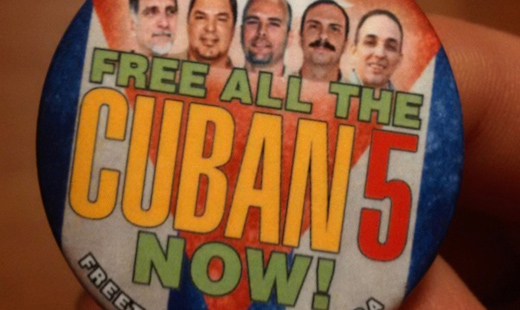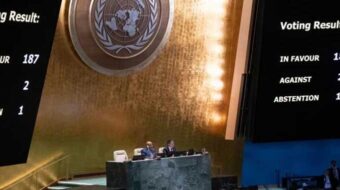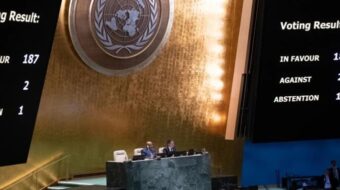
In its third editorial in recent weeks on U.S.-Cuba relations, the New York Times called on Sunday for the United States government to carry out a humanitarian exchange with Cuba whereby Cuba would release government contractor Alan Gross and the United States would release the three remaining members of the “Cuban Five”: Gerardo Hernandez, Ramon Labañino and Antonio Guerrero.
Two other members of the five, Rene Gonzalez and Fernando Gonzalez, have served out their sentences and are back in Cuba.
The Cuban government, as the editorial points out, has been hinting at its willingness to consider such an exchange for several years now.
The Cuban Five, who had been in Miami surreptitiously observing the activities of Cuban exile groups which had in the past carried out terrorist attacks in Cuba, were arrested in 1998. Their trial took place in a politically overheated atmosphere right after the incident with the Cuban child Elian Gonzalez.
Gross was arrested in Cuba in 2009 when he was caught smuggling in electronic equipment designed to bypass Cuban security’s signal blocking mechanisms, a violation of a Cuban law which penalizes anybody who helps to keep the U.S. trade blockade of Cuba going. He was sentenced to 15 years in prison.
The New York Times editorial calls for the Obama administration to begin negotiations with the Cuban government for a humanitarian prisoner exchange, which it rightly notes could be the ice breaker for a further normalization of U.S.-Cuba ties.
The strongest and most original part of the editorial focuses on the case of one of the Five, Gerardo Hernandez, who is serving two life sentences on trumped up charges of murder. Gerardo was the coordinator of the group to which the five belonged. On Feb. 24, 1996 two small aircraft belonging to the Cuban exile political organization Brothers to the Rescue (Hermanos al Rescate) were shot down by Cuban jets after buzzing Havana to drop leaflets which called on the Cuban people to overthrow their government. Four people were killed. Cuban authorities had repeatedly warned the United States that if it did not rein in the Brothers to the Rescue flights, which violated both Cuban and U.S. law, they would eventually take such action. But Gerardo was convicted of murder, and appeals ultimately did not thrive.
The New York Times editorial takes up the tale:
“One of the [appeals court] judges, Phyllis Kravitch, wrote a dissenting opinion arguing that Mr. Hernandez’ murder-conspiracy conviction was unfounded. Prosecutors, she argued, failed to establish that Mr. Hernandez, who provided Havana with information about the flights, had entered into an agreement to shoot down the planes in international, as opposed to Cuban, airspace. Downing the planes over Cuban airspace, which the exiles had penetrated before, would not constitute murder under American law.
The United States has refused to make public information it has which it claims proves that the planes were shot down over international waters, raising suspicions about their authenticity.
The editorial correctly points out that when various people have asked U.S. officials, including Secretary of State John Kerry, why the U.S. is not receptive to the idea of exchanging Gross for the remaining members of the Five, the reply has been that there is not an “equivalency” between the two cases. The “non-equivalency” claim is based on the conviction of Gerardo Hernandez for murder. But Judge Kravitch’s doubts about the validity of the prosecution case against Gerardo suggest that sufficient pressure could cause the U.S. authorities to back off the non-equivalency claim, which they must know is shaky. So it is extremely helpful for the Times editorial to point out this little known item.
There is currently a habeas corpus petition before the courts, in the name of Gerardo Hernandez, Ramon Labañino and Antonio Guerrero, based on the many errors in the original trial.
These errors include the subsequently revealed information that the U.S. government had been paying so-called “journalists” in Miami who subsequently whipped up a storm of hatred against the Five during their trial, making it impossible to shield jurors from publicity detrimental to the defendants.
Though the Times editorials, coming from one of the most influential and widely read newspapers in the country, are of great practical importance, the third one does contain some mistakes that need to be corrected. That Mr. Gross’ imprisonment is “the chief obstacle to a diplomatic breakthrough” is to be doubted; it more likely the chief pretext. Gross is not a person being held “hostage” or for “ransom or political leverage”; he was convicted in open court of violating a Cuban law he should have known about. The main reason Cubans don’t have better access to the internet is that the U.S. economic blockade makes it harder to get both hardware and software. Whether efforts such as the one Mr. Gross was engaged in can be considered “pro democracy” is a stretch, to say the least.
But on balance, the initiative by the Times is very helpful.
Photo: TelesurvTV












Comments